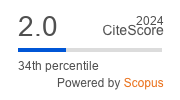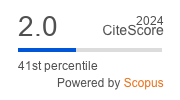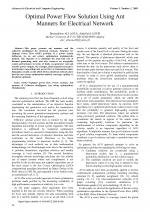| 1/2009 - 6 |
Optimal Power Flow Solution Using Ant Manners for Electrical NetworkALLAOUA, B., LAOUFI, A. |
| Extra paper information in |
| Click to see author's profile in |
| Download PDF |
Author keywords
optimal power flow, power systems, ant manners and collective intelligence, ant colony optimization, metaheuristic
References keywords
optimization(13), power(11), system(10), problem(10), dorigo(10), colony(6), systems(5), algorithms(5), routing(4), problems(4)
Blue keywords are present in both the references section and the paper title.
About this article
Date of Publication: 2009-02-03
Volume 9, Issue 1, Year 2009, On page(s): 34 - 40
ISSN: 1582-7445, e-ISSN: 1844-7600
Digital Object Identifier: 10.4316/AECE.2009.01006
Web of Science Accession Number: 000264815300006
SCOPUS ID: 67749109811
Abstract
This paper presents ant manners and the collective intelligence for electrical network. Solutions for Optimal Power Flow (OPF) problem of a power system deliberate via an ant colony optimization metaheuristic method. The objective is to minimize the total fuel cost of thermal generating units and also conserve an acceptable system performance in terms of limits on generator real and reactive power outputs, bus voltages, shunt capacitors/reactors, transformers tap-setting and power flow of transmission lines. Simulation results on the IEEE 30-bus electrical network show that the ant colony optimization method converges quickly to the global optimum. |
| References | | | Cited By «-- Click to see who has cited this paper |
| [1] H. W. Dommel, W. F. Tinney, "Optimal Power Flow Solutions", IEEE Transactions on Power Apparatus and Systems, vol. PAS-87, No. 10, pp. 1866-1876, 1968. [CrossRef] [SCOPUS Times Cited 1385] [2] T. Bouktir, M. Belkacemi, K. Zehar, "Optimal power flow using modified gradient method", Proceedings ICEL'2000, U.S.T. Oran, Algeria, pp. 436-442, 2000. [3] R. Fletcher, Practical Methods of Optimization, John Willey & Sons, 1986. [4] M. Dorigo, "Optimization, learning, and natural algorithms", Ph.D. Dissertation (in Italian), Dipartimento di Elettronica, Politecnico di Milano, Italy, 1992. [5] M. Dorigo, G. Di Caro, "The ant colony optimization metaheuristic, New Ideas in Optimization, McGraw-Hill, pp. 11-32, 1997. [6] M. Dorigo, G. Di Caro, L. M. Gambardella, "Ant algorithms for discrete optimization", Artificial Life, Vol.5, No.2, pp. 137-172, 1999. [CrossRef] [PubMed] [Web of Science Times Cited 1705] [SCOPUS Times Cited 2292] [7] M. Dorigo, V. Maniezzo, A. Colorni, "Ant System, optimization by a colony of cooperating agents", IEEE Trans. System Man. and Cybernetics, Part B: Cybernetics, Vol. 26, No. 1, pp. 29-41, 1996. [CrossRef] [PubMed] [Web of Science Times Cited 7632] [SCOPUS Times Cited 10583] [8] M. Dorigo, L. M. Gambardella, "Ant colonies for the traveling salesman problem", BioSystems, Vol. 43, pp. 73-81, 1997. [CrossRef] [Web of Science Times Cited 1276] [SCOPUS Times Cited 1683] [9] M. Dorigo, L. M. Gambardella, "Ant colony System: a cooperative learning approach to the traveling salesman problem", IEEE Transactions on Evolutionary Computation, Vol. l, No. 1, pp. 53-66, 1997. [CrossRef] [SCOPUS Times Cited 7015] [10] V. Maniezzo, A. Colorni, "The ant System applied to the quadratic assignment problem", IEEE Trans. Knowledge and Data Engineering, Vol.11, No.5, pp. 769-778, 1999. [CrossRef] [Web of Science Times Cited 354] [SCOPUS Times Cited 510] [11] T. Stuetzle, M. Dorigo, "ACO algorithms for the quadratic assignment problem", New Ideas in Optimization, McGraw-Hill, 1999. [12] B. Bullnheimer, R. F. Haiti, C. Strauss, "Applying the ant System to the vehicle routing problem", MetaHeuristics: Advances and Trend in Local Search Paradigms for Optimization, Kluwer, pp. 285-296, 1999. [13] B. Bullnheimer, R. F. Haiti, C. Strauss, "An improved ant System algorithm for the vehicle routing problem", Ann. Oper. Res., Vol. 89, pp. 319-328, 1999. [CrossRef] [Web of Science Times Cited 380] [SCOPUS Times Cited 540] [14] L. M. Gambardella, E. Taillard, G. Agazzi, "MACS-VRPTW a multiple ant colony System for vehicle routing problems with time Windows", New Ideas in Optimization, McGraw-Hill, pp. 63-76, 1999. [15] G. Di Caro, M. Dorigo," Ant colonies for adaptive routing in packet-switched communication networks", Proc. 5th Int. Conf. Parallel Problem Solving From Nature, Amsterdam, The Netherlands, pp. 673-682, 1998. [CrossRef] [SCOPUS Times Cited 103] [16] D. Costa, A. Hertz, "Ants can color graphs", J. Oper. Res. Soc., Vol. 48, pp. 295-305, 1997. [CrossRef] [17] L. Schoofs, B. Naudts, "Ant colonies are good at solving constraint satisfaction problems", Proc. 2000 Congress on Evolutionary Computation, San Diego, CA, 2000, pp. 1190-1195, 2000. [18] I. A. Wagner, A. M. Bruckstein, "Hamiltonian(t)-an ant inspired heuristic for recognizing Hamiltonian graphs", Proc. 1999 Congress on Evolutionary Computation, Washington, D.C., pp. 1465-1469, 1999. [19] A. Bauer, B. Bullnheimer, R. F. Hartl, C. Strauss, "Minimizing total tardiness on a single machine using ant colony optimization", Central Eur. J. Oper. Res., Vol. 8, No. 2, pp. 125-141, 2000. [20] A. Colorni, M. Dorigo, V. Maniezzo, M. Trubian, "Ant system for job-shop scheduling", Belgian J. Oper. Res., Statist. Comp. Sci. (JORBEL), Vol. 34, No. 1, pp. 39-53, 1994. [21] M. Den Besteb, T. Stützle, M. Dorigo, "Ant colony optimization for the total weighted tardiness problem", Proc. 6th Int. Conf. Parallel Problem Solving from Nature, Berlin, pp. 611-620, 2000. [CrossRef] [SCOPUS Times Cited 149] [22] D. Merkle, M. Middendorf, "An ant algorithm with a new pheromone evaluation rule for total tardiness problems", Proceedings of the EvoWorkshops 2000, Berlin, Germany: Springer-Verlag, Vol. 1803 Lecture Notes in Computer Science, pp. 287-296, 2000. [23] A. J. Wood, B.F. Wollenberg, "Power Generation, Operation and Control", 2nd Edition, John Wiley, 1996. [24] V. Del Toro, "Electric Power Systems", Vol. 2, Prentice Hall, Englewood Cliffs, New Jersey, USA, 1992. [25] G. W. Stagg, A. H. El Abiad, "Computer methods in power systems analysis", McGraw Hill International Book Company, 1968. [26] S. Kumar, R. Billinton, "Low bus voltage and ill-conditioned network situation in a composite system adequacy evaluation", IEEE Transactions on Power Systems, Vol. PWRS-2, No. 3, 1987. [CrossRef] [Web of Science Times Cited 6] [SCOPUS Times Cited 16] [27] D.S. Johnson, L.A. McGeoch, "The traveling salesman problem: a case study in local optimization", Local Search in Combinatorial Optimization, John Wiley and Sons, pp. 215-310, 1997. [28] D. Gaertner: Natural Algorithms for Optimisation Problems", Final Year Project Report, June 20, 2004. [29] L. L. Lai, J. T. Ma, R. Yokoma, M. Zhao, "Improved genetic algorithms for optimal power flow under both normal and contingent operation states", Electrical Power & Energy, System, Vol. 19, No. 5, pp. 287-292, 1997. [CrossRef] [Web of Science Times Cited 268] [SCOPUS Times Cited 369] [30] J. Yuryevich, K. P. Wong, "Evolutionary Programming Based Optimal Power Flow Algorithm", IEEE Transaction on power Systems, Vol. 14, No. 4, November 1999. [CrossRef] [Web of Science Times Cited 340] [SCOPUS Times Cited 527] Web of Science® Citations for all references: 11,961 TCR SCOPUS® Citations for all references: 25,172 TCR Web of Science® Average Citations per reference: 399 ACR SCOPUS® Average Citations per reference: 839 ACR TCR = Total Citations for References / ACR = Average Citations per Reference We introduced in 2010 - for the first time in scientific publishing, the term "References Weight", as a quantitative indication of the quality ... Read more Citations for references updated on 2025-05-31 11:44 in 88 seconds. Note1: Web of Science® is a registered trademark of Clarivate Analytics. Note2: SCOPUS® is a registered trademark of Elsevier B.V. Disclaimer: All queries to the respective databases were made by using the DOI record of every reference (where available). Due to technical problems beyond our control, the information is not always accurate. Please use the CrossRef link to visit the respective publisher site. |
Faculty of Electrical Engineering and Computer Science
Stefan cel Mare University of Suceava, Romania
All rights reserved: Advances in Electrical and Computer Engineering is a registered trademark of the Stefan cel Mare University of Suceava. No part of this publication may be reproduced, stored in a retrieval system, photocopied, recorded or archived, without the written permission from the Editor. When authors submit their papers for publication, they agree that the copyright for their article be transferred to the Faculty of Electrical Engineering and Computer Science, Stefan cel Mare University of Suceava, Romania, if and only if the articles are accepted for publication. The copyright covers the exclusive rights to reproduce and distribute the article, including reprints and translations.
Permission for other use: The copyright owner's consent does not extend to copying for general distribution, for promotion, for creating new works, or for resale. Specific written permission must be obtained from the Editor for such copying. Direct linking to files hosted on this website is strictly prohibited.
Disclaimer: Whilst every effort is made by the publishers and editorial board to see that no inaccurate or misleading data, opinions or statements appear in this journal, they wish to make it clear that all information and opinions formulated in the articles, as well as linguistic accuracy, are the sole responsibility of the author.



